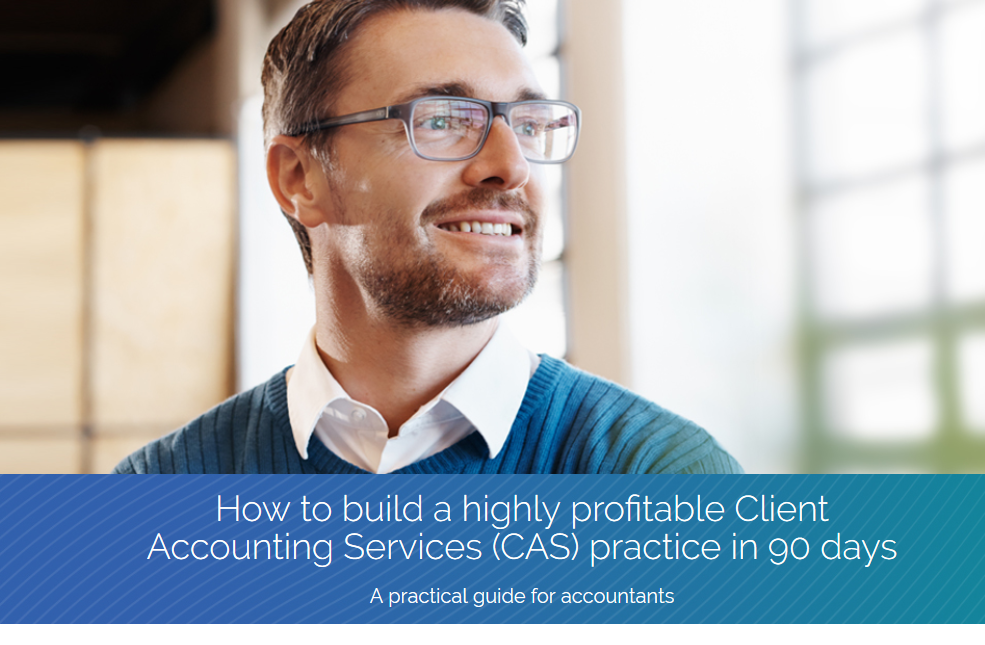Any accounting firm that’s serious about giving clients what they need and value – and raising their own relevance and bottom line – can’t afford to lose out on the tremendous opportunities created by Client Accounting Services (CAS). And if you want to get CAS right, there are 5 essential components that you need to master.
In this guide, we will:
- Briefly explain what CAS is, and why it has become more important now
- Dispel four common myths about CAS
- Discuss how you can start offering CAS quickly – and then grow it consistently
- Prepare you to offer CAS with a minimal investment of time and resources by first targeting your existing client base in a systematic manner
- Detail the keys to sustaining long-term profitability from CAS
This is an excerpt from the free Guide to Profitable Client Accounting Services.
You can easily increase your profits from your accounting practice by 50% or more using the techniques presented in this guide, provided you have a reasonable number of clients who currently use a G/L system like QuickBooks, QuickBooks Online, Sage or other similar systems.
The highly actionable insights presented in this guide are derived from our in-depth understanding of the real needs of accounting firms and their clients – insights that we have gained from serving the profession for the past 30 years. We have also relied on frequent feedback from accounting firm owners who have made CAS one of the highest revenue-earning segments of their practices.
What is CAS?
Traditionally, CAS means you, the accountant, do most (if not all) of the accounting work for your clients. That means you perform:
- After-the-fact financial statement preparation (also called “write-up”).
- Transaction processing. Processing of AP, AR, payroll, sales and payroll taxes, etc.
- Outsourced CFO and/or controller services. This work entails ongoing, higher-level services to review financial performance and provide input on strategies to improve business.
This definition of CAS is limited in scope. In our view, you are a true practitioner of CAS if you are able to customize your accounting practice for each client to best serve their needs, while maximizing your firm’s profits.
Our definition of CAS includes all the services included in traditional Client Accounting Services and then some. But it goes deeper into identifying the needs of different clients to better serve them.
Accounting clients can be classified into three main categories:
- Clients who write manual checks. This is the traditional after-the-fact write-up work.
- Clients who want to offload all their accounting work to their accountant. This is Outsourced Accounting Services. (Do not confuse Outsourced Accounting Services with Offshore Accounting Services, which means taking accounting work to a third party offshore.)
- Clients who want to perform some of the accounting work (e.g. transaction processing) in their office. In a professional system, accountants work collaboratively with their clients, while remaining in full control.
A true CAS practice focuses on the needs of the clients in each of these categories and optimizes the processes for each.
In this guide we’ll focus primarily on Outsourced Accounting Services (OAS) because that’s the area that’s new to most accountants. We use the term CAS for Outsourced Accounting Services.
Why CAS and why now?
Imagine you gathered your accounting clients in a room and asked, “If you love doing accounting, please raise your hand.”
How many hands do you believe will go up? Certainly no more than a few.
Independent research has confirmed that most small business owners consider accounting work a nuisance and a distraction from running their businesses.
There are three compelling reasons why you should offer CAS:
- Clients want and desperately need those services.
- Using the right cloud solutions, you can offer Client Accounting Services using about the same amount of resources your firm currently uses for client accounting work, e.g. performing trial balance work and preparing financials.
- You can grow your profits by 50% and more without adding any clients or staff.
The bottom line is that offering Client Accounting Services is a win-win for both you and your clients. The lost opportunity cost is significant if you don’t offer CAS.
Traditionally, in the desktop era, businesses did their own transaction entry work, e.g., they issued invoices, paid bills, etc. Accountants took that data to perform trial balance work and prepare financial statements.
But there are multiple problems with this model. Small businesses had to hire a bookkeeper or accounting staff to perform that work. Managing the work internally was a big headache for business owners. Most small businesses had to settle for mediocre staff that produced low-quality work. Accountants ended up spending a significant amount of time fixing the errors clients made. Also, by the time accountants got the data, it was too late for them to offer timely advice to their clients. This model turned accounting into a very inefficient commodity service that provided little tangible value.
We were frustrated fixing our clients’ messy books. But we were afraid if we didn’t, someone else would and we’d lose clients. But fixing those messes revealed a pattern of poor business decisions our clients were making – leading to not just their books, but their entire business in a mess. We knew we had to help, so we started offering collaborative CAS services, and our clients are happier than ever.
~ Hitesh Patel Owner, HRP CPAs PC
But the cloud has transformed the ways in which clients can work collaboratively with accountants. It has made integration between multiple applications designed to perform specific tasks possible, resulting in a streamlined workflow. And it has automated some key processes to minimize data entry.
Now, with the right cloud solution, your staff can do everything that your clients’ staff does – only faster, easier and more accurately, all without leaving the office.
Ready to start creating your own profitable CAS practice? We’re ready to help.
-
Keep reading the rest of this free Guide to Profitable Client Accounting Services.
Thanks for reading CPA Practice Advisor!
Subscribe Already registered? Log In
Need more information? Read the FAQs




